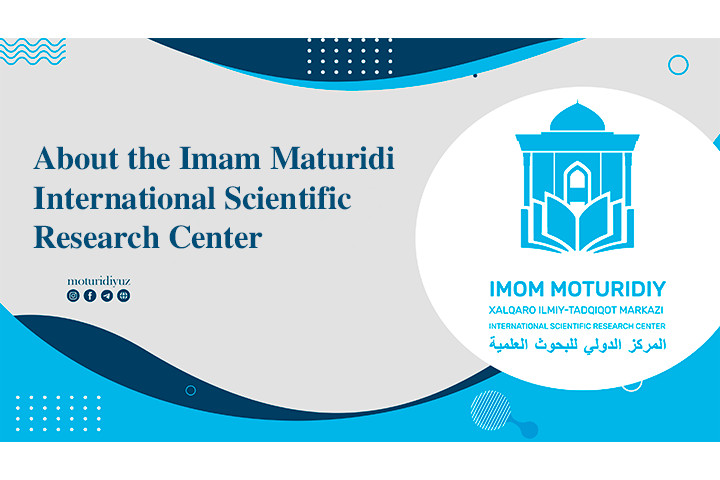
About the Imam Maturidi International Scientific Research Center
Imam Maturidi International Scientific Research Center under the International Islamic Academy of Uzbekistan was established by the Decree of the President of the Republic of Uzbekistan dated August 11, 2020 “On measures to establish the Imam Maturidi International Scientific Research Center”.
The primary goals of the Center are to study in-depth the heritage of our great thinker, the founder of the doctrine of Maturidiyya, Imam Abu Mansur Maturidi and his followers, to study and widely promote their invaluable contribution to the development of the sciences of Kalam and Aqeeda, preservation and development of our national and religious values, on this basis, educating the younger generation in the spirit of noble universal ideas, and to strengthen their ideological immunity against harmful influences alien to our spiritual and enlightenment views.
The main tasks of the center are:
- In-depth study of the great scientific, religious and spiritual heritage of our great compatriot Imam Maturidi and Maturidi scholars who made an invaluable contribution to the development of the sciences of Kalam and Aqeeda, the publication of scientific translations of their works, popularization among our people and the world community and systematic organization of scientific research on these topics;
- In-depth study of the contribution of our scholars such as Imam Maturidi, Abul Muin Nasafi to the development of the science of Kalam, educating the younger generation in the spirit of the original values of Islam, such as interethnic and interreligious tolerance, mutual respect, and peace;
- Scientific study of the humanistic nature of Islam, its enlightenment and cultural role and directions of development on the scientific basis and communicating to the general public;
- Collection of original and electronic copies of manuscripts and lithographs of the heritage of our great scholars stored in our country and in the libraries and archives of foreign countries, which are related to the science of Kalam and of great scientific importance to the Islamic world and the organization of systematic scientific research to pass them to future generations;
- Organizing conferences, symposiums, exhibitions, scientific reports, seminars, training, competitions, and other cultural and educational events on scientific-theoretical and methodological issues in order to strengthen international cooperation in the field of Islamic sciences, in particular, the history of kalam and its current significance;
- preparation of encyclopedias, catalogs, albums, scientific-popular science documentaries, information resource base on the results of research and organization of publication in mass media, in particular, on the Internet;
- to inform the scientific community about the results of new research in the field of Islamic history and Kalam;
- prevention of unfounded attacks on Islam based on the idea of "enlightenment against ignorance", as well as the study of fanaticism, goals, ideological foundations, modern views and working methods of extremism, and the development and application of scientific and educational bases for combating them.
The center has 4 scientific departments: "Department of Research on Maturidiyya Studies", "Department of Modern Islamic Studies", "Department of Translations", and "Department of Publications", as well as the Department of International Relations and the Information Resource Center.
The center has 40 employees, including 24 researchers. The center has one Egyptian and one Kyrgyz researcher.
In order to apply the world's best practices and innovative methods in research to the Center, to develop scientific solutions and practical proposals and recommendations on topical issues of Islamic studies, in particular, Moturidiyya studies, as well as to support research on current issues of Islamic studies an international scientific board has been established under the Center.
The international scientific board consists of 22 members. They are Muhammad Nazir Ayyad, Rafik Mukhametshin, Mustafa Cherich, Said Fuda, Hamza Bakri, Angelika Brodersen, Hulya Alper, Mouhanad Khorchide, Yusuf Shavqi Yavuz, Syed Abubakar Muttaqi, Kamaluddin Nurdin Merjuni, Ashirbek Muminov, Zaylabidin Ajimamatov, Ramil Adygamov, Homidjon Ishmatbekov, Shovosil Ziyodov, Saidmukhtor Akilov, Khabibullo Sagdiev, and Abdullatif Allakulov.
 O`Z
O`Z
 РУ
РУ
 EN
EN
 العربية
العربية

Notes